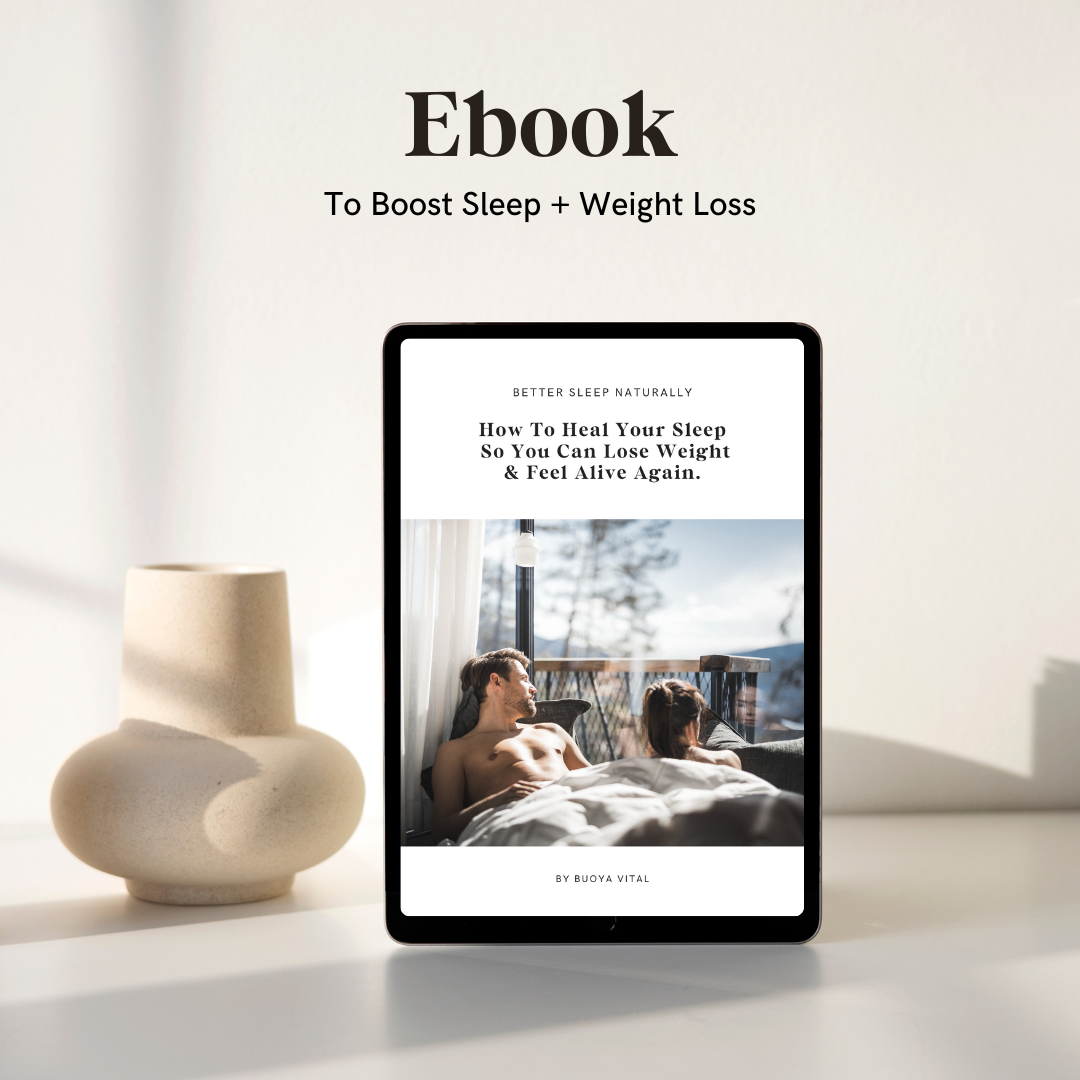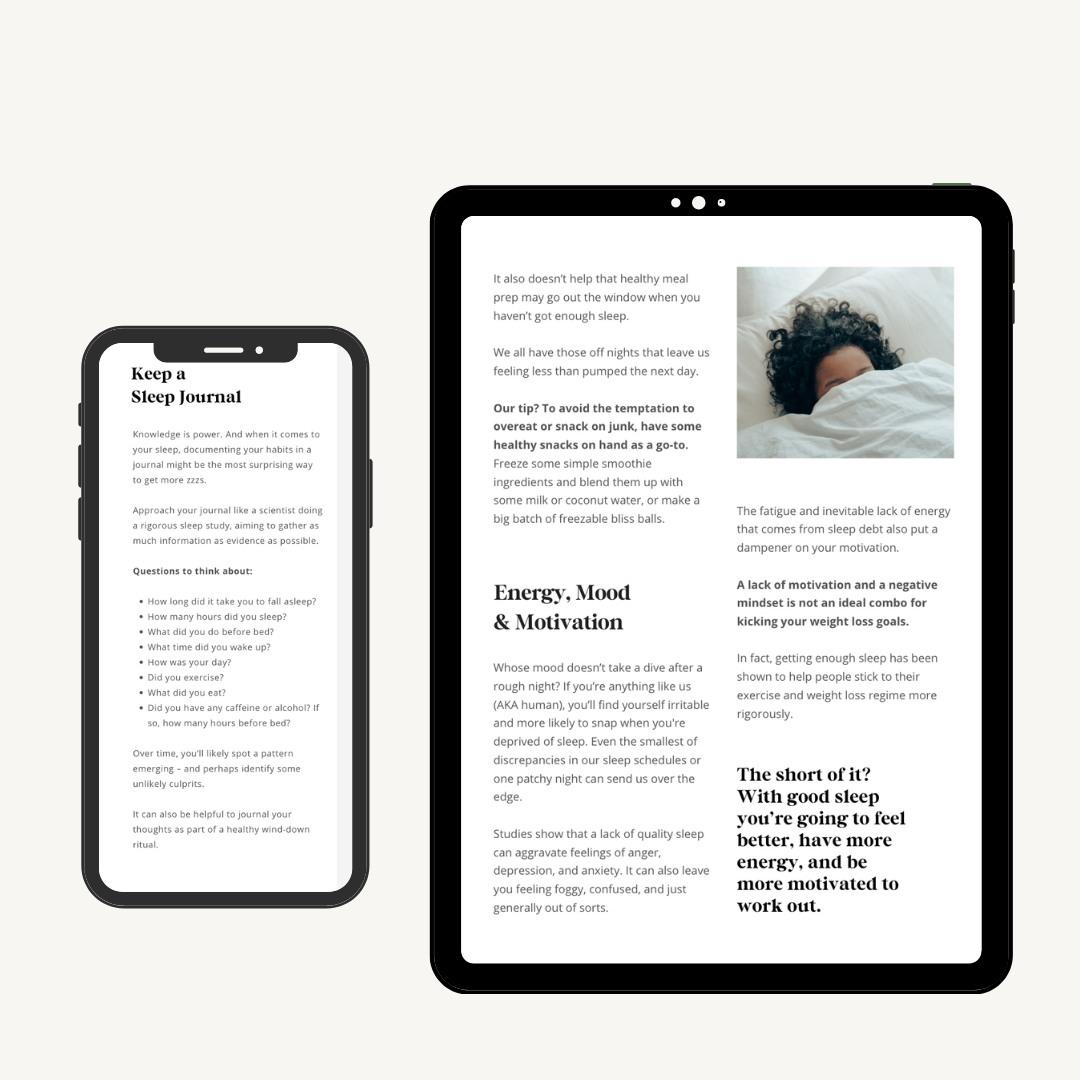Research has named sleep as an essential part of any weight loss plan, so it begs the question, is a lack of quality sleep sabotaging your weight loss?
Hitting the gym and fanatically counting calories on MyFitnessPal but still have excess pounds hanging on for dear life?
Your sleep may be to blame, with experts agreeing quality sleep is as influential to your health, well-being and weight as diet and exercise (and much more enjoyable than a punishing session on the treadmill).
As you probably already know, feeling tired makes you more likely to skip the gym and load up on sugar or junk food to get through the day. But it goes beyond that.
What Happens When We Sleep?
Believe it or not, when we sleep, our bodies are actually hard at work. We even burn calories! Research shows that for a 150-pound person, an estimated 440 calories will be burnt over 7 hours sleep. For most people that equates to a 60-minute brisk walk, or a 40-minute jog!
When we sleep, our bodies also repair cells and tissues, restore our immune system, removes waste and toxins, consolidates memories and regulates our hormones.
All this is essential for maintaining our overall health and directly impacts our ability to lose and maintain a healthy weight.

Fat Loss
One study found that a lack of sleep messes with our metabolism by disrupting normal hormonal cycles. The effect of this flows on to our ability to lose weight and maintain muscle.
In other words, not getting enough adequate sleeps encourages our bodies to store fat and burn muscle. Not ideal for dropping those extra pounds and toning up.
Researchers found that when people lost sleep over two weeks, they lost 55% less weight from fat – despite eating the same number of calories.
This explains why your weight may have plateaued despite keeping up your healthy eating and exercise. Sleep could be the missing ingredient.
REM Sleep and Weight Loss
Our bodies burn the most fat during REM sleep, the deepest stage of the sleep cycle.
The best way to get more REM sleep is simply by getting enough quality sleep, for most people that means 8 hours. Your body will do the rest!
It's important to note that alcohol consumption will stop your body entering REM sleep. Mathew Walker, Professor of neuroscience and psychology at the University of California Berkeley, tells us that, as a by-product of your body metabolizing alcohol, the chemical aldehyde is created. Aldehydes are known to block your brain from entering REM sleep (also known as dream sleep).
Metabolism and Appetite
Picture this, you’ve had a rough night, maybe you were up with kids, stayed up late watching Netflix, or perhaps like a lot of us you just struggle to sleep.
You’re feeling sluggish and hangry and you head straight to the fridge, again and again. If this sounds like you, you’re not alone.
Research suggest that sleep deprivation makes us more likely to overeat. One study found that neuronal activity in response to food stimuli was greater after restricted sleep.
In other words, you’re more likely to find yourself at the drive through or helping yourself to that extra office cake if you’ve slept poorly.
Too little sleep makes our cortisol (stress hormone) spike. This encourages our bodies to conserve energy; as a result our metabolism slows and our bodies find it harder to burn fat.
It also doesn’t help that healthy meal prep may go out the window when you haven’t got enough sleep.
We all have our off nights that leaving us feeling less than pumped the next day. Our tip? To avoid the temptation to overeat or snack on junk, have some healthy snacks on hand as a go to. Freeze some simple smoothie ingredients and blend up with some milk or coconut water or make a big batch of freezable bliss balls.
Energy and Mood
Whose mood doesn’t take a dive after a rough night? If you’re anything like us (just human), you’ll find yourself irritable and more likely to snap when your deprived of sleep. Even the smallest of discrepancies can send one over the edge after a patchy night’s sleep.
Studies show that a lack of quality sleep can aggravate feelings of anger, depression and anxiety. It can leave you feeling foggy, confused and just generally out of sorts.
The fatigue and inevitable lack of energy that comes from sleep debt also puts a dampener on our motivation.
A lack of motivation and a negative mindset is not an ideal combo for kicking your weight loss goals. In fact, getting enough sleep has been shown to help people stick to their exercise and weight loss regime more rigorously.
The short of it? With good sleep you’re going to feel better, have more energy and be more motivated to work out.

The Sleep-Gut Connection
As we've mentioned, without enough shut-eye, you can upset the balance of your hormones, causing the stress hormone cortisol to rise. This can result in intestinal permeability, AKA leaky gut, where toxins and bacteria can pass through your bloodstream – giving you a gutful of problems like bloating and gas, inflammation, stomach pain, and food sensitivity or intolerance. More seriously, research suggests leaky gut is linked with a higher risk of autoimmune diseases.
Less sleep also means specific gut bacteria (the bad kind) become more active. These strains lead to an increase in hunger and cravings for junk food... useful for a post lunch energy crash, not great for your weight loss efforts, Yikes!
When left untreated, a leaky gut can lead to chronic brain inflammation, which can aggravate symptoms of depression, anxiety, and stress. And when stressed, you’re more likely to be kept up at night with racing thoughts… See where we’re going with this?
With restorative sleep, you’ll naturally maintain a healthy gut microbiome that helps you lose weight sustainably. But if you want to supercharge your gut health (and its sleep-inducing neurotransmitters), start with your diet. Our ebook has some great easy recipes for better sleep as a starting point.
Diet Tips for Better Sleep
- Eat fermented food (probiotics)
Fermentation may have been the ancient method of making food last longer, but new research shows us that fermented food can boost weight loss, improve digestion, and stave off diseases. It's all down to the fermentation process that encourages bacteria to produce gut-friendly microbes and metabolites. Kimchi, kefir, kombucha, and sauerkraut are all rich sources of these beneficial bacteria.
Studies have also shown probiotics can decrease insomnia symptoms and improve sleep patterns and quality. Combined with prebiotics, you're giving your gut the best possible chance for better sleep and weight loss.
- Incorporate prebiotics into your diet
- Supplements for better sleep
If you need a little help getting a good night's sleep, consider trying a natural sleep promoting supplement. Maybe we’re biased but we’re big fans of Buoya Vital’s Rest + Restore formula. After struggling with our own personal sleep issues for many years, we set out to create a natural sleep aid we could trust. It’s been a winner for us (and we’re picky!) and our customers.
- Reduce refined sugars
It's well-documented that sugar leads to more restless, disrupted sleep. And emerging research shows that sugar impacts macrobiotic health, too. Of course, it's a vicious cycle: too much sugar makes our sleep worse, and poor quality sleep makes you crave it. Nip it in the bud by cutting out foods high in refined sugar, such as white bread, candy, sodas, cereals, and jar sauces.
- Avoid alcohol before bed
Heavy alcohol consumption impacts the makeup of your gut microbiome, with chronic alcohol users highly likely to find it harder to fall asleep and to experience sleep disturbances through the night. But even a bit of booze can impact your sleep, with one study revealing that having just two standard drinks can decrease your sleep quality by up to 9.3%. If you're used to having a glass of wine to unwind before bed, try a soothing cup of chamomile tea instead. Or if it's the taste you're after, switch it up with alcohol-free wines, beers, or spirits (which have come a blessedly long way.)
Our Top Tips for Improved Sleep
Create a wind down routine that works for you |
Create a wind down routine that works for you. This is a set of rituals you perform at the same time every night to help prepare your body and mind for sleep. Your routine could involve, playing relaxing music, reading, mediation or breathing exercises, 2 minutes of yoga or a cup of herbal tea. |
Ditch the screen |
Researchers found that exposure to blue light from your smartphone can suppress the secretion of melatonin, the body’s essential sleep hormone. Night-time scrolling and texting can also increase alertness and brain activity, making it harder to switch off and slip into the restorative REM stage of sleep. Give your mind the space and peace it needs by switching off your phone at least an hour before bed. Need your smartphone for an alarm? Simple solution: buy an alarm instead! We recommend a sunrise wakeup lamp for a slow and natural morning rise. |
Create a healthy sleep sanctuary |
The experts say the bedroom should be reserved for sleep and sex. That mean's no answering emails from bed, or watching TV! Try black out curtains or an eye mask to help darken your room. Sleep on sheets you love, spritz some lavender mist, invest in a micro foam pillow. Whatever helps you find a little bit of peace in your bedroom. |
Stick to schedule |
Your first step to better sleep is a deceptively simple one: pick a wake-up and sleep time that you’ll stick to every day – yes, even on weekends. It might not be the most exciting idea, but recent studies suggest that reliable sleep and wake times can improve your sleep quality and mental health. |
Know your why |
Take an honest look at how your sleep (or lack thereof) impacts your health, life, work, emotions, and family. Then imagine what your life might look like if you had consistently restful, restorative sleep. Write down your top five reasons for wanting better sleep and keep them somewhere you can see day to day. |
In summary, you're not broken...
The science speaks for itself, there is now no question that without quality sleep, our ability to lose weight can become an uphill battle and harder than it needs to be.
Sleep is a critical "ingredient" for weight loss and a key health pillar for wellbeing and vitality.
Getting great sleep isn't always easy but with a smart approach and the tools that work for you, it can be achieved. And once your sleep improves, everything starts to get easier, including weight loss!
Knowledge is power, take your first step
If you want to boost weight loss through great sleep, start with our ebook. It was written with one thing in mind, to help dramatically improve sleep, lose weight and restore energy.
Packed with sleep science, practical tips, printable resources and thought provoking questions, this ebook aims to motivate and empower you towards better health.
You've got this...and we're in it together!












